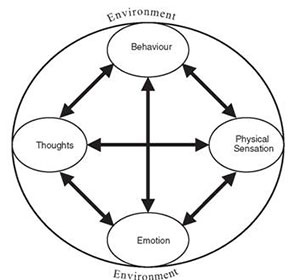Types of therapy
Cognitive Behavioural Therapy
Cognitive Behavioural Therapy (CBT) is a therapeutic intervention with an evidence base for effectiveness with those who have anxiety related disorders (e.g. Obsessive Compulsive Disorder, Phobia, Panic), depression, and Post Traumatic Stress Disorder (PTSD). This intervention is based on the assumption that our feelings/emotions and behaviours/actions are influenced by our thoughts.
All thoughts, feelings and behaviour patterns (problematic or not) in response to our environment are learned through the same processes.
Therefore CBT aims to replace problematic thinking habits with more adaptive thoughts, feelings, behaviours, and subsequent interactions.
CBT sessions are structured with an agenda set at the beginning of each session, it may involve the use of worksheets, and there is likely to be homework which will be reviewed at the beginning of each subsequent session.

Brief Psychotherapy
We are shaped by our past experiences, and our experiences and responses in the here and now will shape our future. People with anxiety, depression, interpersonal problems or seeking a deeper understanding of themselves may find Psychodynamic Psychotherapy effective.
Brief Psychodynamic psychotherapy is an evidence based approach not as in-depth or intensive as psychoanalysis, but through the relationship developed with your therapist, these sessions aim to provide a safe space to process/understand, and bring to consciousness the role of your early experiences/relationships on your current relational patterns.
You would be expected to choose what you want to bring to sessions and the role of the therapist would be to share any observations, interpretations, notable patterns, feelings, unhelpful defences, and connecting experiences they pick up on with you during the course of your therapy.
These appointments will be at least once weekly, with pre-arranged breaks. Maximum effort will be made to ensure they can take place on the same time, day and location each week.
Systemic/Family Psychotherapy

Systemic Psychotherapy focuses on the dynamics and interactional patterns between people. It is the therapeutic approach often used with a family, parts of the family system or teams with the broader family/team in mind.
From a systemic perspective if someone is struggling with a difficulty or has made a significant change it impacts on the people around them and vice versa. The focus is not on one person but rather how people are relating to each other, un/intentional problem maintaining patterns, and family/team strengths.
Family Therapy
Family sessions tend to be less frequent than weekly and those attending appointments may vary across sessions, for example, just parents one session and the whole family another. Families may be seen by an individual clinician, but often clinicians will work in pairs with a family either jointly, or with one clinician as the lead therapist whilst the other therapist/team members observe interactions and feed these back to the lead therapist in the family’s presence to offer a new perspective.
There is an evidence base to support this approach for a number of difficulties within the family including Conduct Disorder, Psychosis, Anxiety related Disorders, Substance misuse, Self-harm and families at risk of breakdown.
Narrative Therapy
Narrative practice comes from the tradition of systemic therapy and is based on the views we hold and the stories that we tell about our lives that influence the choices we make.
Our self-stories are influenced by the society we grow up in, and the social, political and cultural contexts in which we live that influence the range of descriptions available to us, this in turn invites us to behave in certain ways.
Problems arise when these descriptions restrict our choices in ways that do not honour our aspirations, abilities and our hopes and dreams. Narrative therapy aims to help people and those in their system to (re)discover (through self-reflection) more enabling descriptions of themselves and those around them in ways that open up hope and possibilities for the future.
Solution Focused Therapy
Solution focused therapy is a collaborative way of working which focuses on the goals, solutions, and strengths of the client, as opposed to the problems.
Bereavement Therapy
This therapy focuses on managing the complex grieving and mourning processes after the death, terminal illness, loss, or major change of a significant person to the client.
Eclectic Therapy
It is not always helpful to stick rigidly to one therapeutic model, especially when a client has a combination of complex difficulties. Our clinicians are trained in several psychological models and may decide during initial appointments that a combination of approaches informed by these models would be most effective.
If this is the case we would recommend and discuss this with you so that you can make an informed decision about whether you would like to commence therapy with us.
Narrative Exposure Therapy
Narrative Exposure Therapy (NET) is used for people who have had multiple and sustained traumatic experiences. With the support of the therapist the client is guided to voice their story of their significant life experiences in chronological order, this can effectively help the client to process their trauma experiences.
Eye Movement Desensitization and Reprocessing
Eye Movement Desensitization and Reprocessing (EMDR) reprocessing the trauma begins with the client’s focus on a traumatic experience, and the use of Bilateral Stimulation; that is the visual, auditory, or tactile external stimuli occurring in an alternating rhythm (e.g. eye movement, tapping) whilst the client observes and feeds back what they notice. This can effectively help the client to process and explore root experiences feeding their trauma responses.

